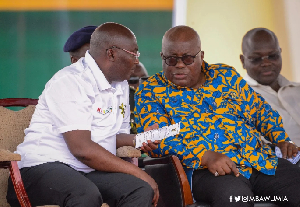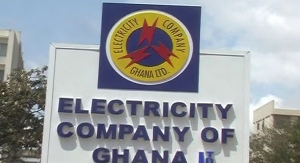...for soccer honours
Four-time Africa champion Ghana appears to be in soccer wilderness.
The West African country, which dominated soccer in the 1960s, had its last triumph at the African Cup of Nations in Libya two decades ago.
Apart from two victories in the Under-17 World championship and two final appearances in the World Youth Championship meant for Under-21 players, Ghanaians have hardly had anything to cheer about.
Not even the brilliant performances in Europe by such stars as Abedi Ayew Pele, Tony Yeboah and Samuel Kuffour could lift the Black Stars national team from these dark periods.
Many attempts to play in the World Cup have ended in tears and disappointment, sometimes at the last hurdle.
Lots of reasons have been given for the poor showing of the players --poor domestic league, poor training facilities, poor salaries, poor coaches, poor administration, among other things.
But the beginning of the process of nurturing players --hunting for talents and pitches-- is crucial for the development of soccer in Ghana.
"Our pitches are nothing to write home about," said a soccer fan. And he is not wrong. Infrastructure development has been insignificant.
The biggest stadiums have remained the 50,000 spectator-capacity stadium in Accra, which is the home ground of four premier league clubs and the 55,000 people-capacity stadium in Kumasi, used by Asante Kotoko and King Faisal for their league matches. Both stadiums were built in the 1950s and have only seen periodic renovation.
The National Sports Council (NSC) has playing fields scattered all over the country in the name of stadiums but most of them are in deplorable condition.
Nkawkaw Park in the Eastern Region has been declared a security risk, forcing premier league campaigners, Okwahu United, to move away from there to honour their matches at the Accra Sports Stadium.
There appears to be some hope as new generation teams make effort to develop their own playing fields.
Liberty Professionals have developed a site at Dansoman, a suburb of Accra as their park. Though the playing field is lush green, the club still plays premier league matches at the Accra Sports Stadium for security reasons.
Dawu Youngsters have built a standard stadium at their Eastern Region base and play their home matches there while they train at the Kaneshie Sports Complex in Accra.
Goldfields Club, owned by the multinational gold mining Ashanti Goldfields Company, built the Len Clay Stadium at Obuasi. This is the only real stadium owned by any club in Ghana.
The country's two biggest clubs, Accra Hearts of Oak and Kumasi Asante Kotoko, are still tenants on the National Sports Council property.
Dearth of stadia has compelled the Ghana Football Association to schedule league matches in Accra and Kumasi on Saturdays and Sundays whereas by tradition and for convenience, Ghanaians watch soccer on Sundays.
Youth and Sports Minister Edward Osei-Kwaku has pledged the government's commitment to the provision of infrastructure in the country.
The minister promised that he would spearhead the construction of an Olympic complex in the capital for which land has been acquired.
Osei-Kwaku has advised all district assemblies to commit part of their common fund to the provision of infrastructure for sports.
















